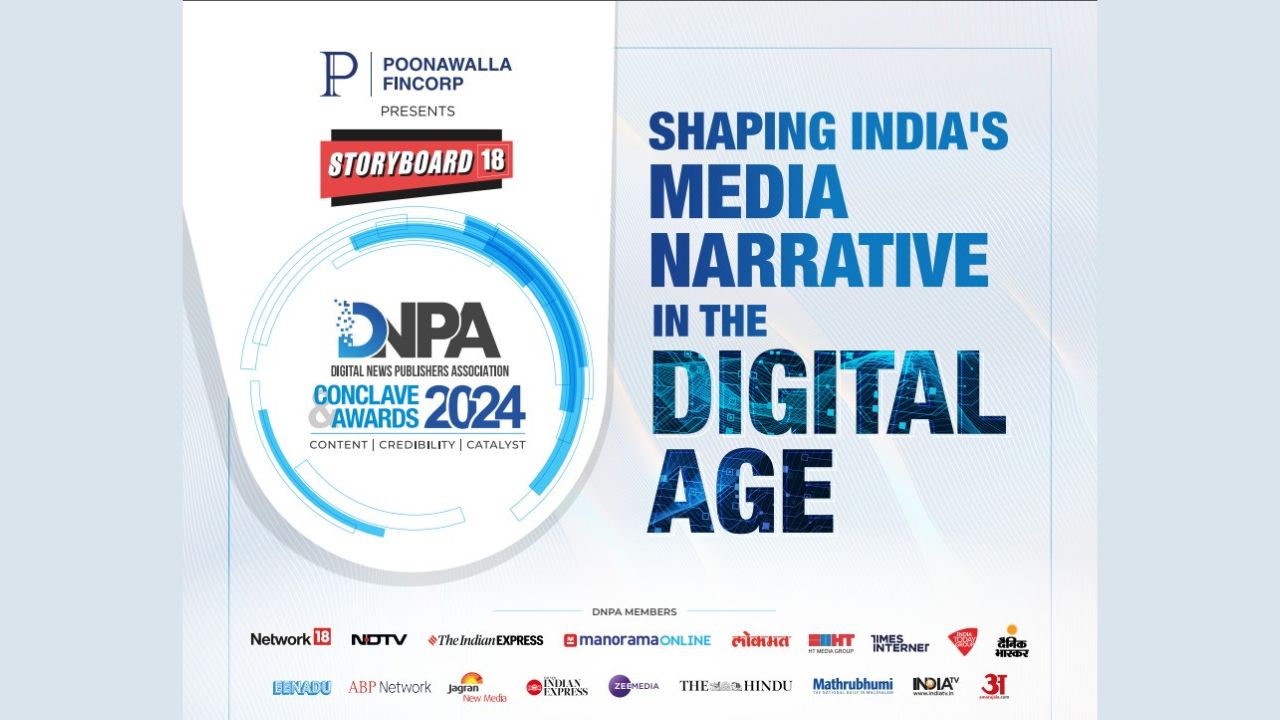The future of digital media in a time of AI-led transformation and the relationship between news publishers and Big Tech platforms was up for deep discussions as luminaries, policymakers, and stakeholders assembled at the DNPA Conclave and Awards 2024 in New Delhi, on February 6.
Digital News Publishers Association of India (DNPA) is the apex industry body of the digital arms of India’s top 18 new publishers from print and electronic media. Recognised for its role to promote credible news and safeguarding the cause of growth of the news industry, the conclave was organised by DNPA in association with Storyboard18.
The DNPA conclave also comes at a time when India is on the cusp of rolling out a Digital India Act to help policymakers create a more level-playing field in the digital space and safeguard sustainable models and growth.
The discussion on Media Trust in the Digital Age: Balancing Influence and Integrity Session Chair had Nalin Mehta, Managing Editor, Moneycontrol as the moderator with Shri Apar Gupta, Lawyer, Meghna Bal, Head of Research, Esya Centre, Vinit Goenka, Author and Former BJP Spokesperson, Sanjay Goel, Member, Grievance Appellate Committee, Government of India , Arvind Arora, YouTuber and Akash Banerjee, Social and Political Satirist, Founder, TheDeshBhakt (YouTube Channel).
Banerjee who is trying to poke fun at something which is real and also trying to build an audience asks pertinent questions “Is it possible to tread a fine line? Is it possible to be sarcastic yet factual? Is it possible to be financially viable?” and says, “We have been doing all of this since the last five years. We have been caustic, we have been sarcastic, and we have been financially solvent. We didn’t have to beg for money in front of an industrialist or a politician. We ask for money con social media, we have membership drive. What is going to matter is who believes in you, what is your credibility? And, that could be extreme left or extreme right or maybe centralists like us who call ourselves constitutionalists. And, there will be no one over compassing channel or one over compassing anchor who the whole nation will look up to at 9 pm. That era is disappearing. Overall there is more democratization of information.”
While talking about how important it is to keep the trust in satire, Banerjee says, “It’s 150 percent more important. I take inspiration from the fact that the anchors at late night American television have more trust in the American audience than the prime time 9 o clock anchors. Do not confuse that someone sitting with a tie and suit with a multimillion dollar studio will have more trust than someone using a mobile phone to talk on the road.”
Goenka shared his point of view and said, “The challenge is how do you see between the lines. There are ones who tell you the truth and there are ones who create the truth. With the advent of the internet and social media, sometimes the internet presents facts in such a way that you feel that it is truth but it is not. It requires lot of intelligence to understand that and it becomes duty of people like us to come and counter that.”
Arora says, “Think before you post anything on social media. T stands for trustworthy, H is for helpful, I is for inspiring, N is for necessary, and K is for kind. When I started on YouTube with my motivation videos, we had said that we will post everything except the negative thing. I always tell my team to research as much as they can on any topic that we are going to post.”
While talking about trust in media going down, Bal says, “It is an enduring trend. These trends are not restricted to the developed world. There is research from the Reuters institute and Oxford which reveals that countries like India and Brazil are witnessing decrease in trust in the regular news outlets and the trust gap between information on social media and general news is decreasing. The research also says people know news to be fair, impartial and they wanted it to be accurate. The solutions towards this end is quite challenging o implement because what is fair and partial to me might be different to others. Broadly, people want more transparency; therefore, if there is conflict of interest, it should be disclosed. “
She added that generally when one talks about trust in media, everyone pushes it towards social media saying that they are the problem but at the end of the day, they are doing quite a bit in terms of putting out initiatives to foster trust and safety. “We don’t have a Reuters Institute equivalent in India; these are all important to engage with the public.”
Gupta addressed Digital Protection Act and said, “In this act, there is no exemption for journalists. This means the personal information you gather is susceptible to a future date and time to a dispute which may hold up a story in public interest. It’s also impacted the right to information law by which third party information or what was confidential which could be disclosed in public interest cannot be done any longer. That cares of the digital data protection act”
He talks about problem of trust and regulation is enabling it to a higher extent, “The two principal stakeholders which hold immense power in terms of data control are the private Silicon Valley platforms which serve is the content on our phones. Do we know how much YouTube spends on its largest markets in terms of trust and safety? It’s the same with Meta platforms. Disclosure reports have revealed that Meta spent 92-94 percent on trust and safety in North America while it spent 6 percent on the rest of the world.”
